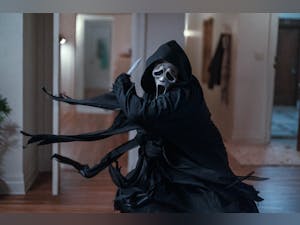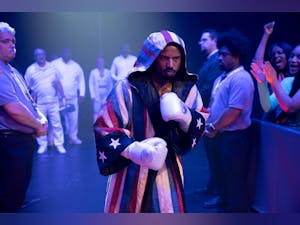From: Silver Screen
'The Divine Order' is a charming feminist manifesto

The latest shows and movies coming to a screen near you.
“In 1971, the world was changing…but here at home, time stood still.” These are the words that open “The Divine Order,” hinting at the world the viewer is stepping into; a world still full of sexism and inequality. Despite the film’s familiar story arc, it is complemented by a dynamic cast, a brisk pace, and impeccable comedic timing that make it one of a kind.
After the introduction, which was laced with footage from ‘60s and ‘70s social movements, the viewer is brought to a small Swiss village. Here is where the film’s protagonist Nora (Marie Leuenberger) is introduced, -- the voice behind the quote at the beginning -- and her sister-in-law Theresa (Rachel Braunshweig).
While doing the family’s housework, Theresa convinces Nora to talk to Theresa’s rebellious daughter Hanna, who is refusing to talk to her mother for forbidding her from seeing a man with “long hair” whom she “loves.” Nora first discovers through talking to Hanna the idea that women are capable of doing more than just cooking and cleaning, even though that’s what was socially accepted. This, as well as a chance encounter with a grassroots feminist organization in town, quickly leads her down a path towards activism.
Nora embarks on an Odyssey of self discovery, and meets several other women who share her rapidly radicalizing values -- radical by conservative Switzerland’s standards, where women were forbidden from even taking jobs outside of the house without their husband's’ blessing.
The film’s greatest strengths are its utter lack of subtlety and the fact that it embraces its tropes, taking them in a different and fun direction. Everything from the sexist, “back-in my-day” family patriarch to the inevitable gratuitous (but hilarious) scene where the women discover the “sexual revolution,” the film maintains a sort of self-aware elegance that can rarely be achieved.
Speaking on the scene in question, Nora and her small team of grassroots feminists Theresa, Vroni (Sibylle Brunner) and Graziella (Marta Zoffoli) go to a demonstration in Zurich, where they attend a workshop on self discovery. Much to the surprise of the ladies, the speaker reveals a large model of a vagina, and later shows a diagram of the different “types” of vaginas, all named after different animals. The women were then asked to take a mirror, undress, and examine their vaginas to find out which one they were (according to Nora hers was a “tiger”). Watching the women’s discomfort as this new experience unfolded was easily one of the film’s highlights.
This is indicative of the films comedic timing as well. Writer (and director) Petra Biondina Volpe is able to tackle a topic as serious as the fight for women's suffrage but intersperse moments of pure satisfaction to make sure that the tone is never too somber.
There is a scene where Nora’s sexist father-in-law threatens to tell her husband Hans (Maximilian Simonischek) about her grassroots campaign -- something that he was vehemently against. Nora’s rebuttal to this threat is, “At the same time, you can tell him all about your sex magazines,” effectively shutting him up. The film is filled with these delightful little quips which make its limited flaws much more palatable.
The only point where the film falters is its failure to fully develop truly interesting (and seemingly integral) characters. For example, Nora’s foil, the conservative intellectual Dr. Charlotte Wipf (Therese Affolter) of “The Anti-Politication of Women Action Committee,” is a fierce opponent to women's suffrage. She was a fitting villain for this film, but she maintains only sporadic relevance throughout, with the much less interesting mob of angry men taking her place.
“The Divine Order,” while Switzerland’s entry for the Academy Awards, is the perfect fit for America’s current political climate. The film’s minor shortcomings can be counted on one hand, while its strongest elements flourish. “The Divine Order” is a natural fit for feminists, but appeals to any and all who desire a wonderful piece of historical fiction in film.
Grade: A-
life@theeagleonline.com
The Divine Order was released in theaters December 1




